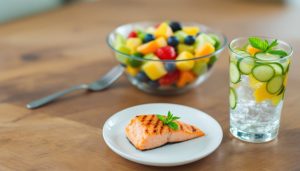Menopause brings with it a range of physical and emotional changes—hot flashes, sleep disruption, mood swings, and weight fluctuations, to name a few. While every woman’s experience is unique, one of the most powerful tools for managing symptoms and supporting overall well-being during this time is nutrition.
A well-balanced diet rich in essential nutrients can help stabilize hormones, support bone and heart health, reduce inflammation, and ease common symptoms of menopause. Here are some meal ideas designed with these goals in mind—meals that are not only nourishing but also satisfying and easy to prepare.
Breakfast: Fuel to Start the Day Right
- Oats with Berries, Flaxseed, and Almond Butter
- Why it helps: Oats are rich in fiber, which supports heart health and digestive function. Flaxseeds contain lignans, a plant compound that may help balance estrogen. Berries are packed with antioxidants, and almond butter adds healthy fats and protein.
- Tip: Add a sprinkle of cinnamon to help regulate blood sugar.
- Greek Yogurt Parfait with Chia Seeds and Walnuts
- Why it helps: Greek yogurt provides calcium and probiotics. Chia seeds support hydration and digestion. Walnuts contain omega-3s that may help reduce inflammation and mood swings.
Lunch: Balanced and Blood Sugar-Friendly
- Grilled Salmon Salad with Leafy Greens and Avocado
- Why it helps: Salmon is high in omega-3 fatty acids and vitamin D—both important during menopause. Leafy greens like spinach and kale offer calcium and magnesium, which support bone and muscle health. Avocado adds fiber and healthy fats.
- Lentil and Quinoa Bowl with Roasted Vegetables
- Why it helps: Lentils and quinoa are plant-based protein sources and rich in fiber, which helps regulate blood sugar and digestion. Roasted veggies like sweet potatoes and broccoli provide a range of vitamins and antioxidants.
Dinner: Comforting Yet Light
- Stir-Fried Tofu with Bok Choy and Brown Rice
- Why it helps: Tofu is a great source of plant-based estrogen-like compounds (phytoestrogens) that may help with hot flashes. Bok choy is a cruciferous veggie that supports hormone detoxification. Brown rice adds complex carbs and fiber.
- Chicken and Vegetable Soup with Whole-Grain Toast
- Why it helps: Bone broth-based soups are easy to digest and provide collagen and minerals. Add colorful vegetables for antioxidants and fiber, and serve with whole-grain bread for sustained energy.
Snacks and Extras
- Hard-boiled eggs with cherry tomatoes
- Edamame with sea salt
- Smoothie with spinach, frozen berries, flaxseed, and plant-based protein powder
- Dark chocolate and a handful of almonds
Nutritional Tips for Menopausal Women
- Focus on whole, unprocessed foods: These are nutrient-dense and support hormone balance.
- Increase calcium and vitamin D: For bone health—found in dairy, leafy greens, tofu, and fortified plant milks.
- Add healthy fats: Such as avocado, olive oil, nuts, seeds, and fatty fish.
- Limit sugar and caffeine: Both can worsen hot flashes, mood swings, and sleep problems.
- Stay hydrated: Hormonal changes can lead to dryness and fatigue, so drink plenty of water.
Final Thoughts
Menopause is not just a challenge—it’s a turning point. With the right foods, you can nourish your body and mind, stabilize your energy, and feel empowered through the transition.
These meal ideas are more than just sustenance—they’re a form of self-care. Listen to your body, honor what it needs, and choose foods that support you not just during menopause, but for the vibrant years beyond.
You’re not losing vitality—you’re redefining it, one nourishing bite at a time.
















